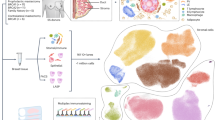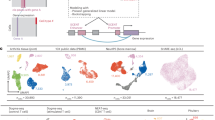Abstract
Rare DNA-sequence variants hold important clinical and biological information, but existing detection techniques are expensive, complex, allele-specific, or don’t allow for significant multiplexing. Here, we report a temperature-robust polymerase-chain-reaction method, which we term blocker displacement amplification (BDA), that selectively amplifies all sequence variants, including single-nucleotide variants (SNVs), within a roughly 20-nucleotide window by 1,000-fold over wild-type sequences. This allows for easy detection and quantitation of hundreds of potential variants originally at ≤0.1% in allele frequency. BDA is compatible with inexpensive thermocycler instrumentation and employs a rationally designed competitive hybridization reaction to achieve comparable enrichment performance across annealing temperatures ranging from 56 °C to 64 °C. To show the sequence generality of BDA, we demonstrate enrichment of 156 SNVs and the reliable detection of single-digit copies. We also show that the BDA detection of rare driver mutations in cell-free DNA samples extracted from the blood plasma of lung-cancer patients is highly consistent with deep sequencing using molecular lineage tags, with a receiver operator characteristic accuracy of 95%.
This is a preview of subscription content, access via your institution
Access options
Access Nature and 54 other Nature Portfolio journals
Get Nature+, our best-value online-access subscription
$29.99 / 30 days
cancel any time
Subscribe to this journal
Receive 12 digital issues and online access to articles
$99.00 per year
only $8.25 per issue
Buy this article
- Purchase on Springer Link
- Instant access to full article PDF
Prices may be subject to local taxes which are calculated during checkout






Similar content being viewed by others
Change history
22 November 2017
In the version of this Article originally published, owing to a technical error, the Life Sciences Reporting Summary was not included; this summary is now available.
References
Bettegowda, C. et al. Detection of circulating tumor DNA in early- and late-stage human malignancies. Sci. Transl. Med.6, 224ra24 (2014).
Wan, J. C. M. et al. Liquid biopsies come of age: towards implementation of circulating tumour DNA. Nat. Rev. Cancer17, 223–238 (2017).
Heitzer, E., Ulz, P. & Geigl, J. B. Circulating tumor DNA as a liquid biopsy for cancer. Clin. Chem.61, 112–123 (2015).
Schwarzenbach, H., Hoon, D. S. B. & Pantel, K. Cell-free nucleic acids as biomarkers in cancer patients. Nat. Rev. Cancer11, 426–437 (2011).
Lewis, K. Persister cells, dormancy and infectious disease. Nat. Rev. Microbiol.5, 48–56 (2007).
Jones, S. E. & Lennon, J. T. Dormancy contributes to the maintenance of microbial diversity. Proc. Natl Acad. Sci. USA107, 5881–5886 (2010).
Ford, C. B. et al. Mycobacterium tuberculosis mutation rate estimates from different lineages predict substantial differences in the emergence of drug-resistant tuberculosis. Nat. Genet.45, 784–790 (2013).
Khodakov, D., Wang, C. & Zhang, D. Y. Diagnostics based on nucleic acid sequence variant profiling: PCR, hybridization, and NGS approaches. Adv. Drug Deliv. Rev.105, 3–19 (2016).
Newton, C. R. et al. Analysis of any point mutation in DNA. The amplification refractory mutation system (ARMS). Nucleic Acids Res.17, 2503–2516 (1989).
Vargas, D. Y., Kramer, F. R., Tyagi, S. & Marras, S. A. Multiplex real-time PCR assays that measure the abundance of extremely rare mutations associated with cancer. PLoS ONE11, e0156546 (2016).
Gonzalez de Castro, D. et al. A comparison of three methods for detecting KRAS mutations in formalin-fixed colorectal cancer specimens. Br. J. Cancer107, 345–351 (2012).
Morlan, J., Baker, J. & Sinicropi, D. Mutation detection by real-time PCR: a simple, robust and highly selective method. PLoS ONE4, e4584 (2009).
Didelot, A. et al. Competitive allele specific TaqMan PCR for KRAS, BRAF and EGFR mutation detection in clinical formalin fixed paraffin embedded samples. Exp. Mol. Pathol.92, 275–280 (2012).
Lanman, R. B. et al. Analytical and clinical validation of a digital sequencing panel for quantitative, highly accurate evaluation of cell-free circulating tumor DNA. PLoS ONE10, e0140712 (2015).
Kinde, I., Wu, J., Papadopoulos, N., Kinzler, K. W. & Vogelstein, B. Detection and quantification of rare mutations with massively parallel sequencing. Proc. Natl Acad. Sci. USA108, 9530–9535 (2011).
Newman, A. M. et al. An ultrasensitive method for quantitating circulating tumor DNA with broad patient coverage. Nat. Med.20, 548–554 (2014).
Pel, J. et al. Nonlinear electrophoretic response yields a unique parameter for separation of biomolecules. Proc. Natl Acad. Sci. USA106, 14796–14801 (2009).
Kidess, E. et al. Mutation profiling of tumor DNA from plasma and tumor tissue of colorectal cancer patients with a novel, high-sensitivity multiplexed mutation detection platform. Oncotarget6, 2549 (2015).
Wang, J. S. & Zhang, D. Y. Simulation-guided DNA probe design for consistently ultraspecific hybridization. Nat. Chem.7, 545–553 (2015).
Song, C. et al. Elimination of unaltered DNA in mixed clinical samples via nuclease-assisted minor-allele enrichment. Nucleic Acids Res.44, e146 (2016).
Orum, H. et al. Single base pair mutation analysis by PNA directed PCR clamping. Nucleic Acids Res.21, 5332–5336 (1993).
Arcila, M., Lau, C., Nafa, K. & Ladanyi, M. Detection of KRAS and BRAF mutations in colorectal carcinoma: roles for high-sensitivity locked nucleic acid-PCR sequencing and broad-spectrum mass spectrometry genotyping. J. Mol. Diagnost.13, 64–73 (2011).
Li, J. et al. Replacing PCR with COLD-PCR enriches variant DNA sequences and redefines the sensitivity of genetic testing. Nat. Med.14, 579–584 (2008).
Milbury, C. A., Li, J. & Makrigiorgos, G. M. Ice-COLD-PCR enables rapid amplification and robust enrichment for low-abundance unknown DNA mutations. Nucleic Acids Res.39, e2 (2011).
SantaLucia, J. Jr & Hicks, D. The thermodynamics of DNA structural motifs. Annu. Rev. Biophys. Biomol. Struct.33, 415–440 (2004).
Owczarzy, R., Moreira, B. G., You, Y., Behlke, M. A. & Walder, J. A. Predicting stability of DNA duplexes in solutions containing magnesium and monovalent cations. Biochemistry47, 5336–5353 (2008).
Zhang, D. Y., Chen, S. X. & Yin, P. Thermodynamic optimization of nucleic acid hybridization specificity. Nat. Chem.4, 208–214 (2012).
Wu, L. R. et al. Continuously tunable nucleic acid hybridization probes. Nat. Methods12, 1191–1196 (2015).
Dobosy, J. R. et al. RNase H-dependent PCR (rhPCR): improved specificity and single nucleotide polymorphism detection using blocked cleavable primers. BMC Biotechnol.11, 80 (2011).
Wang, C., Bae, J. H. & Zhang, D. Y. Native characterization of nucleic acid motif thermodynamics via non-covalent catalysis. Nat. Commun.7, 10319 (2016).
1000 Genomes Project Consortium. An integrated map of genetic variation from 1,092 human genomes. Nature491, 56–65 (2012).
Marx, V. PCR heads into the field. Nat. Methods12, 393–397 (2015).
Lievre, A. et al. KRAS mutation status is predictive of response to cetuximab therapy in colorectal cancer. Cancer Res.66, 3992–3995 (2006).
Narayan, A. et al. Ultrasensitive measurement of hotspot mutations in tumor DNA in blood using error-suppressed multiplexed deep sequencing. Cancer Res.72, 3492–3498 (2012).
Garcia-Murillas, I. et al. Mutation tracking in circulating tumor DNA predicts relapse in early breast cancer. Sci. Transl. Med.7, 302ra133 (2015).
Imperiale, T. F. et al. Multitarget stool DNA testing for colorectal-cancer screening. N. Engl. J. Med.370, 1287–1297 (2014).
Underhill, H. R. et al. Fragment length of circulating tumor DNA. PLoS Genet.12, e1006162 (2016).
Mouliere, F. et al. High fragmentation characterizes tumour-derived circulating DNA. PLoS ONE6, e23418 (2011).
Aird, D. et al. Analyzing and minimizing PCR amplification bias in Illumina sequencing libraries. Genome Biol.12, R18 (2011).
Ross, M. G. et al. Characterizing and measuring bias in sequence data. Genome Biol.14, R51 (2013).
Laehnemann, D., Borkhardt, A. & McHardy, A. C. Denoising DNA deep sequencing data: high-throughput sequencing errors and their correction. Brief. Bioinform.17, 154–179 (2016).
Forbes, S. A. et al. COSMIC: mining complete cancer genomes in the Catalogue of Somatic Mutations in Cancer. Nucleic Acids Res.39, D945–D950 (2010).
Welter, D. et al. The NHGRI GWAS Catalog, a curated resource of SNP-trait associations. Nucleic Acids Res.42, D1001–D1006 (2014).
Hardenbol, P. et al. Multiplexed genotyping with sequence-tagged molecular inversion probes. Nat. Biotechnol.21, 673–678 (2003).
Hiatt, J. B., Pritchard, C. C., Salipante, S. J., O’Roak, B. J. & Shendure, J. Single molecule molecular inversion probes for targeted, high-accuracy detection of low-frequency variation. Genome Res.23, 843–854 (2013).
Narayan, A., Bommakanti, A. & Patel, A. A. High-throughput RNA profiling via up-front sample parallelization. Nat. Methods12, 343–346 (2015).
Acknowledgements
The authors thank J. H. Bae and J. S. Wang for experimental advice; C. Lee and G. Bao for advice and for use of their ddPCR instrument; D. Khodakov for initial testing of BDA on the MiniPCR platform; P. Song for assistance with gel electrophoresis; and A. Narayan for testing BDA in A.A.P.'s lab at the Yale School of Medicine. This work was funded by CPRIT grant RP140132 and NIH grant R01CA203964 to D.Y.Z., and NIH grant R01CA197486 to A.A.P.
Author information
Authors and Affiliations
Contributions
L.R.W. conceived the project, designed and conducted the experiments, analysed the data, and wrote the paper. S.X.C. designed the experiments, wrote automated design software, and analysed the data. Y.W. conducted the experiments and analysed the data. A.A.P. provided clinical samples and analysed the data. D.Y.Z. conceived the project, guided experimental design, analysed the data, and wrote the paper.
Corresponding author
Ethics declarations
Competing interests
There is a patent pending on the BDA system described in this work. D.Y.Z. is a co-founder and significant equity holder of Nuprobe Global, a startup commercializing BDA technology
Additional information
Publisher’s note: Springer Nature remains neutral with regard to jurisdictional claims in published maps and institutional affiliations.
Electronic supplementary material
Supplementary Information
Supplementary discussion, figures, methods, data and code.
Rights and permissions
About this article
Cite this article
Wu, L.R., Chen, S.X., Wu, Y. et al. Multiplexed enrichment of rare DNA variants via sequence-selective and temperature-robust amplification. Nat Biomed Eng 1, 714–723 (2017). https://doi.org/10.1038/s41551-017-0126-5
Received:
Accepted:
Published:
Issue Date:
DOI: https://doi.org/10.1038/s41551-017-0126-5
This article is cited by
-
Improvement of limit of detection in primer extension-based multiplexed mutation assay using capillary electrophoresis
Analytical Sciences (2024)
-
Revealing parental mosaicism: the hidden answer to the recurrence of apparent de novo variants
Human Genomics (2023)
-
Detection of low-frequency mutations in clinical samples by increasing mutation abundance via the excision of wild-type sequences
Nature Biomedical Engineering (2023)
-
Identification of DNA variants at ultra-low variant allele frequencies via Taq polymerase cleavage of wild-specific blockers
Analytical and Bioanalytical Chemistry (2023)
-
Blocker displacement amplification-based genetic diagnosis for autosomal dominant polycystic kidney disease and the clinical outcomes of preimplantation genetic testing
Journal of Assisted Reproduction and Genetics (2023)



